As the temperature plummets across Kashmir, various individuals and social groups are helping the poor brave the bitter cold, reports Saima Bhat
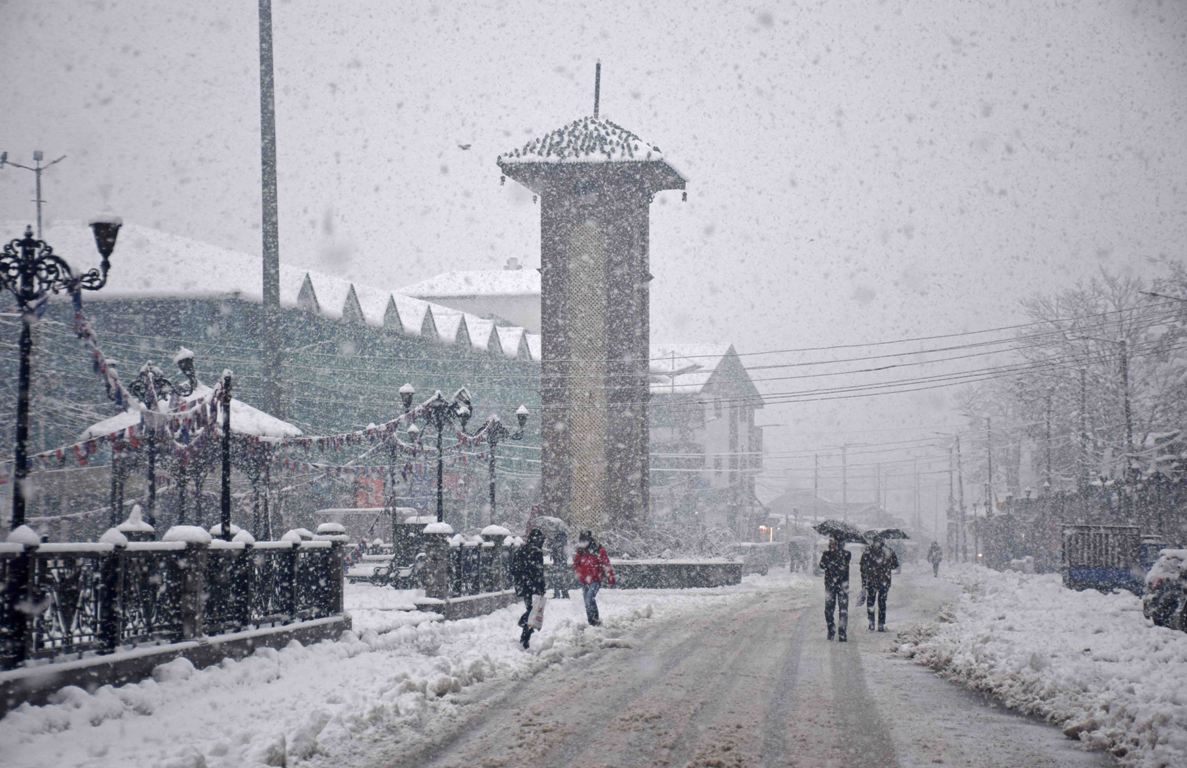
On a spine-chilling January morning Hameed, went out of his home in despair. A man in his early 1960s, he is living in a modest two-room home in one of Srinagar’s uptown localities. His family lacks a facility to stay warm during winters.
Hamid wanted to get Kangri, a few kgs of coal, and a blanket. He had just Rs 500 rupee in his pocket.
A labourer by profession, as he reached Batmaloo by foot after hours of the journey through slippery roads, he did not find anyone selling kangri. He waited on the snow covered footpath. Finally, in the latter part of the day, few Kangri sellers and those dealing with blankets, and coal were visibly audible. He found everything beyond his budget.
“When a vendor said the blanket costs Rs 500, I decided to confirm it from other vendors as well,” Hamed said. “I had just Rs 500 in my pocket and I had to purchase kangri and coal too. I did the bargaining but to no avail.”
As the thought of trembling children came to his mind, he somehow purchased a blanket for Rs 420 and spent the rest of the amount on coal. “This too was a great relief,” he said. “We managed to burn coal in an open container to stay warm.”
Hameed was not the always like this. Once earning modestly, he said his financial condition was badly affected after 2019 siege, followed by 2020 lockdown, otherwise he could have afforded a better living for his children.
Wall of Hope
In the middle of March 2020, when the Covid-19 broke out, the governments globally imposed lockdown. Kashmir was no exception. Resultantly, lockdown 1.0 was imposed and isolation became the norm. People preferred to stay indoors.
Subsequently, there was no movement on the roads. The busy streets were left deserted. In between the scare of virus and imposed idleness, a 2015 batch Jammu and Kashmir police officer, Sheikh Adil thought of people struggling to survive amid pandemic. He initiated an idea. Presently posted as Deputy Superintendent of Police (DySP), he started working with few like-minded people. Soon, he got consent from his department and deployed 17 motorcycles, which otherwise manage traffic in the city, to deliver groceries and life-saving medicines at the doorsteps of the people, mostly under-privileged. The delivery cops would take adequate precautions to stay away from the virulent virus.
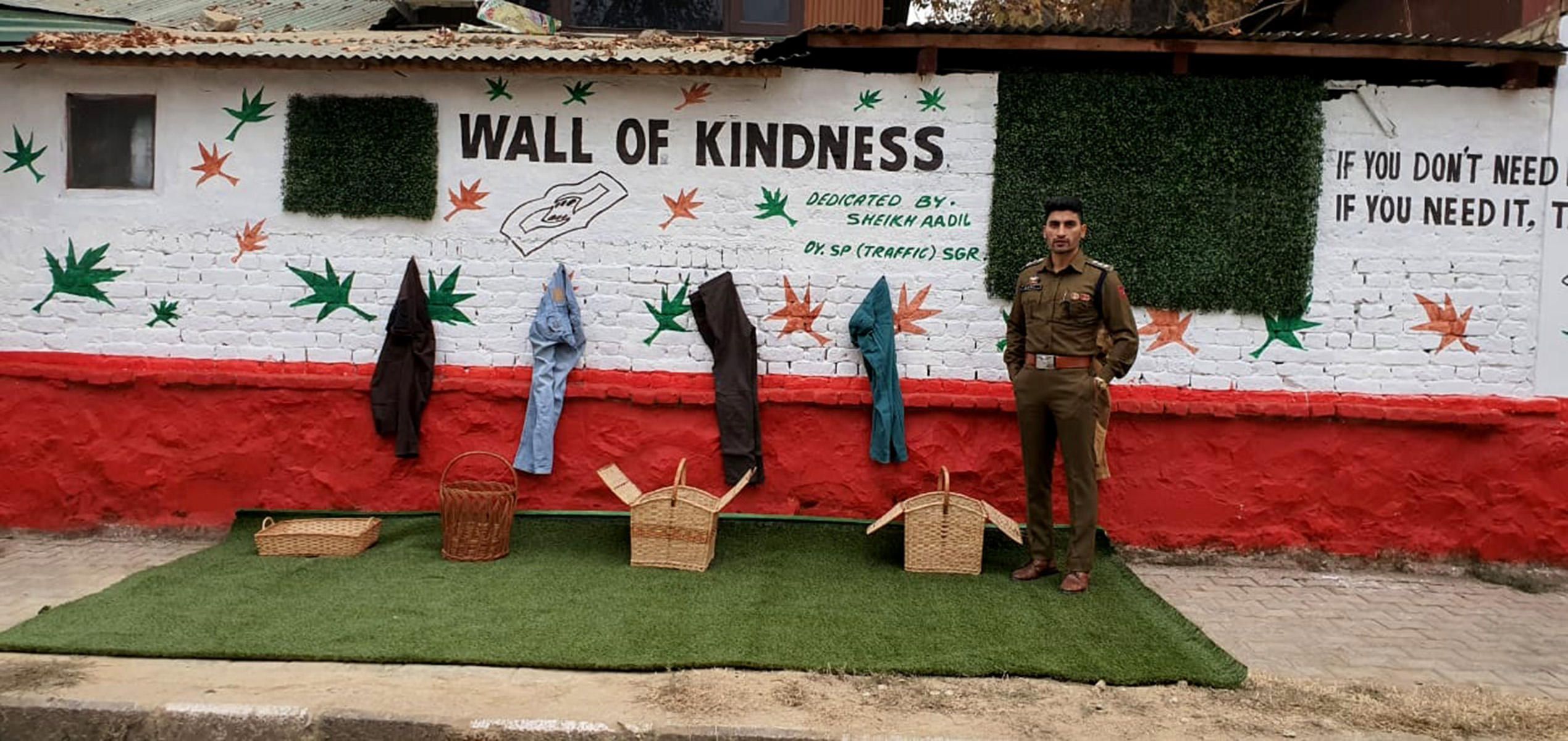
“It was me and some of my like-minded friends who helped,” Adil said. “Many came up with their donations but I refused to take any monetary help. We reached out to around 800 to 1000 families.”
After a less-harsher lockdown-2.0 was announced, Adil decided not to improve the reach. He took the initiative of connecting people for plasma and blood donations. “Those days hospitals were crowded so we also decided to help people who needed oxygen concentrators. We facilitated it,” he said. His group did not stop even after the situation seemingly normalized.
On November 13, which is celebrated as World Kindness Day, Adil thought the pandemic has pushed economically weaker sections further to the wall. He wanted to help people but not monetarily. “Winter was approaching and I thought the people who were working as daily wagers will be facing a lot of problems so while keeping my official mandate in mind I decided to create a neutral interface, where people can donate and at the same time get benefitted without my presence and which is least labour-intensive.”
So, Adil started with a Wall of Kindness in Srinagar, where people can donate warm clothes, blankets, shawls, kangris, cooked and uncooked food, and items of everyday use. With no bar for donation unless and until it is in kind, the idea was appreciated as well as encouraged. “This Wall of Kindness is a charity with dignity, where you don’t know who is donating and to whom. I guess that way we are also ensuring the dignity of the beneficiary.”
The work goes under a tagline If you don’t need it leave it, If you need it take it.
“Luckily we got an overwhelming response and we have seen a good number of people coming and donating wholeheartedly,” Adil said. Soon he started another wall in the old city’s Habba Kadal area, which is a residential area.
“I feel fortunate that people connect with me easily,” Adil believes. “I have been chief guest at many inaugural functions in downtown.”
With this Wall, which is located just opposite the traffic department’s office in Lal Chowk, a few volunteers are always present who make sure the help goes to the right people. The 33-year-old officer said he chose the location outside his office so that he could monitor it.
“We ensure the help does not go to the same person twice,” Adil said. “We don’t go for any detailed checking (of antecedents) but yes we try to remember their faces so that we help more people. I am satisfied that a great number of people have benefitted from this initiative. We don’t count them but there must be around 1000 beneficiaries.”
Adil said that with time this Wall of Kindness has taken a shape of the movement. The model is being imitated. Many such Walls have emerged across Kashmir including Ganderbal and in Jammu as well. He said one more Wall has been started by the Army and one has been started in Kishtwar by the Shaheen Trust.
According to him, there has been an overwhelming response to the initiative. “Every day, hundreds of people come and donate items without even taking the credit”, he said.
Adil is actually reviving a tradition. The Wall of Kindness was started in Kashmir in 2018 when one such wall was painted with black ink on the serene Jhelum Bund. This wall was started by youngsters under an organisation Who is Hussain. They were inspired by a similar concept in Iran and Turkey. They had started a wall each in Budgam, Baramulla, Anantnag, and Srinagar.
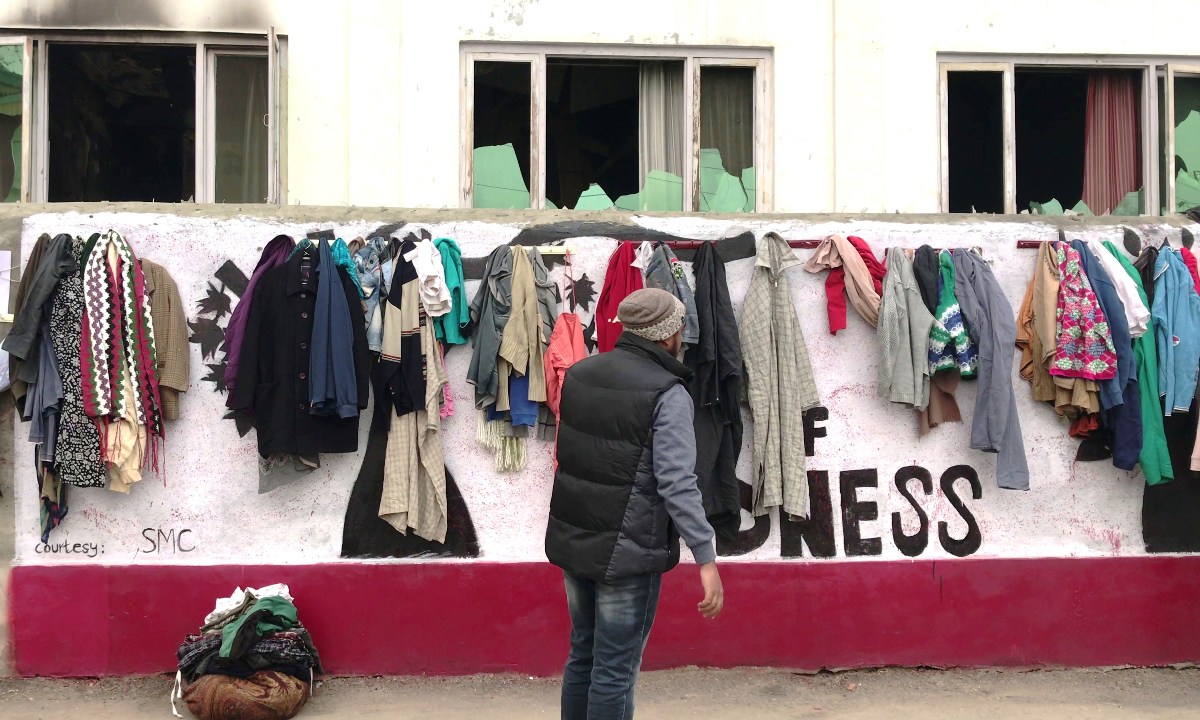
But Adil said he was unaware of any such initiative when he decided to go for it. “I came to know that there was a similar wall at the bund side, which lately has become a dump yard of unserviceable apparels,” he said, “The one we initiated is attended every minute.”
A Bridge
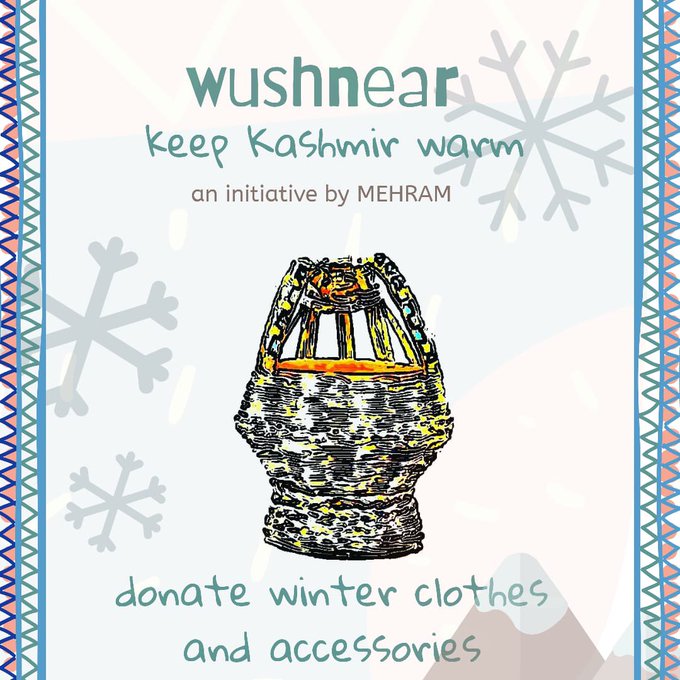
Helping people stay warm in bone chilling winters has emerged into a sort of a movement. Mehram is an NGO working for the welfare of women, especially those facing gender violence. Shehriyar Khanum, who runs it said, she would be frequently asked by women if she has clothes to donate. The repeated queries resonated in her mind that there is a need for warm clothes and she should intervene.
This led the lawyer-entrepreneur to start Wushnear (the warmth). “There are people for whom the winter gadgets are like a luxury,” she said. “We take such things for granted but for them, even a kangri is a luxury item, which now costs around Rs 500.”
Residing and working in Srinagar, Shehriyar knew many organisations would help the needy. “There is no competition in charity. There is always a need for more. But the only thing in our mind was that we have to maintain the dignity of the people who try to help,” Khanum said.
They had to devise a mechanism. Initially, they identified three villages but could only muster help to two villages only. In a village, one each in Bandipore and Tral, they had a list of thirty families and each family had roughly four family members. She said local volunteers helped identify them. They created packets and ensured that each member of the family should get one thing at least.
Her group was already working in the Tral village with the sole focus on menstrual hygiene. “We decided to go back to the same village so that we could make it a long and sustained relationship. We took the details of each member so that we make customised packets. There was no random selection,” she said.
The initiative started with social media posts in November. A month later, the group was in a position to distribute the parcels. “It was a time-consuming process because we had to check the condition of clothes, and pack them properly after cleaning,,” Khanum said. “By mid-January, we were distributing in Bandipore though after a delay.”
Most of the donors, however, contributed brand new clothes, blankets, kangris, pherans, baby clothes, suits, and jackets. She said they did not receive any monetary help because they wanted to get everything in kind barring two cases where the donors wanted them to buy blankets from e-commerce websites.
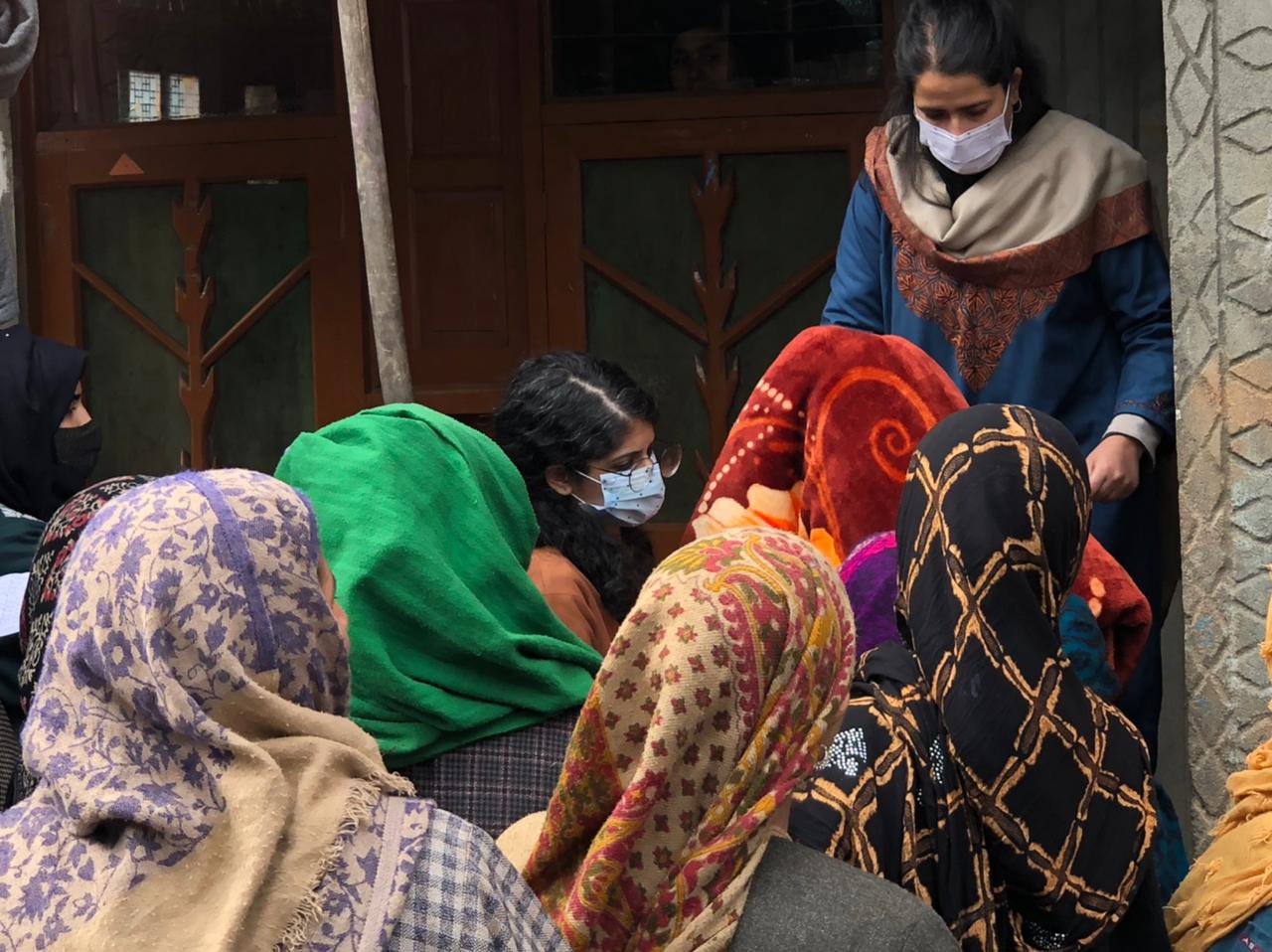
Mehram is an initiative of Khanum and her four more like-minded friends and it is just a quarter old. In September and October, which is mostly seen as the marriages season, this group went with a public appeal on social media for Wardan (trousseau). She said they got an overwhelming response and managed to help around 70 brides under this initiative.
“Social media is very powerful. We send messages to our friends, families, and relatives but for Wushnear we did an extra effort wherein we appealed to all of our Whatsapp contacts,” said Khanum.
Next winter, she said they will start early and would prefer to get the fabric and then stitch Pherans so that they could help more people. “All the help we get is what we pass on. We are just a bridge and I won’t take credit other than that.”
A Concern
In September 2014, when a deadly deluge submerged Kashmir, the crisis was not over. Immediately after some sort of normalcy was restored, there was an early onset of winter. People had lost their belongings in floodwaters. Conscious of the crisis, Dr Muhammad Salim Khan, the head of the Department of Social and Preventive Medicines (SPM) at Government Medical College Srinagar, decided to do something. He took the initiative and started collecting clothes from his friends and relatives and then distributed them among the needy people.
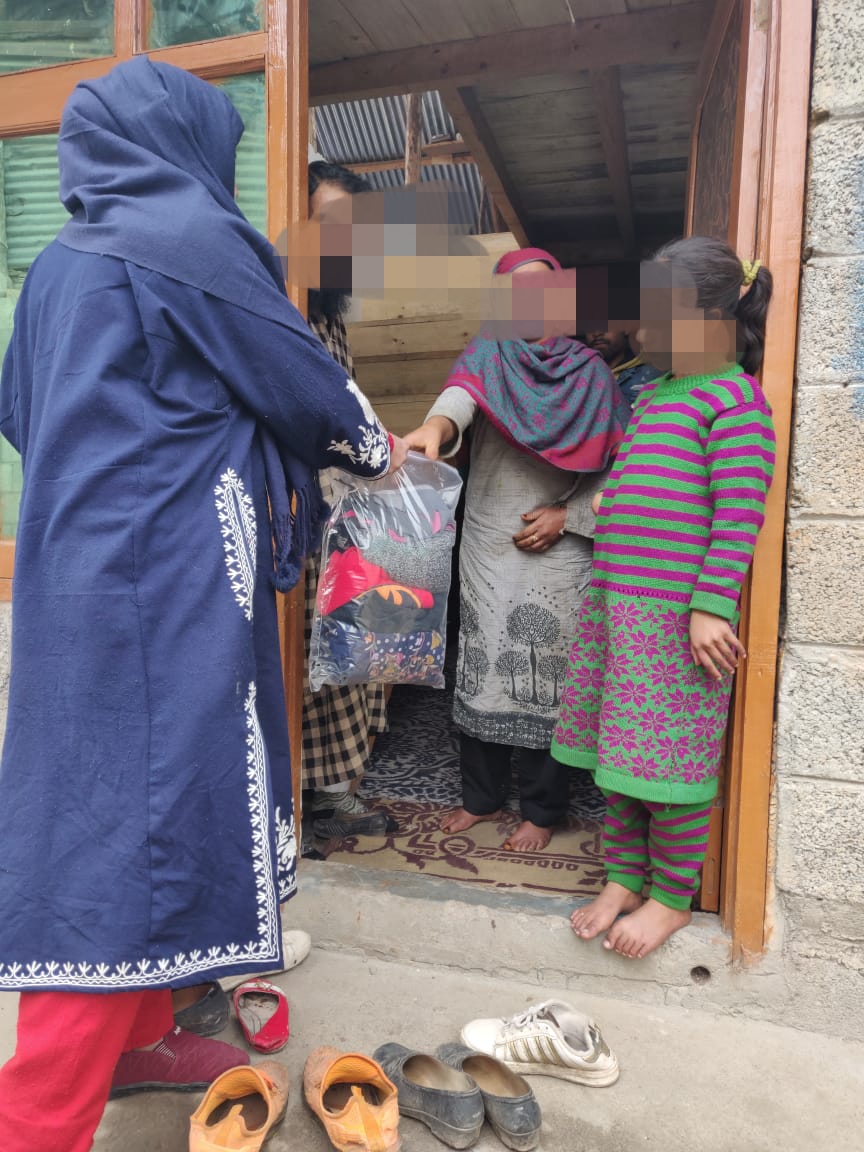
Four years later, Dr Khan again decided to intervene in helping people stay warm. In 2018, however, his modus operandi was different. This time he started with an appeal on social media under the hashtag #apparelsforpoor.
“I got a good response and people came forward and reached out with their donations. This was exclusively for collecting clothes so that nobody should suffer for not having must-haves during the harsh season,” Dr Khan said.
Dr Khan said the help did not come from doctors only, but from other sections of the society as well.
Contradicting the concept that charity should be given without going public, Dr Khan said that when the need arises it was important to go for social messages for the donations.
Talking about organising such initiatives, Dr Khan said it all started from Hazratbal. Giving details, he said when the freshers came for their posting in the SPM department, they had to be posted in the Primary Health Centers (PHC) in Hazratbal block. The doctors posted at the block soon realised the people were very poor and they were not in a position to afford their proper clothing.
“We decided we will collect clothes for them and we started from the GMC faculty group. But then over the years, we expanded our donor group through social media,” he said.
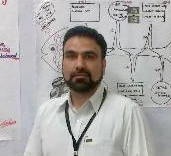
In 2019, he said they couldn’t continue with it due to the ban on the internet but in 2020 they resumed the activity. “We got fresh clothes, pherans, thermals, blankets, coats, jackets, shoes, and unstitched suits. We first see who is in the family and then accordingly make the customised packets for every family.”
So far, they are restricted to the Hazratbal zone only where the distributions are done twice a week, on Wednesdays and Thursdays. But Dr Khan thinks if local Masjids’ act as community centres – in addition to the praying space, then no poor would remain needy.
Ehsaas Experience
Scared to seek help, Abdul, a man in his mid-fifties, was desperate to buy warm clothes for his minor children and wife. Penniless and emotionally devastated, he had nowhere to go. But before his journey back home, a small gathering on the roadside caught his glimpse. As he moved forward enquiring about the event he found that spread over the sheet, there was winter wear for every age group, and liberty to take for free. Abdul took what he needed for his family at home.
Like Abdul, several individuals and families required relief and visited the spot. Without asking, they could get basic requirements. There were silent contributors, who ensured the items taken away were replenished.
Out in the field to seek donations and alleviate the sufferings of people locally, the initiative of helping people with clothing was of Madad Charitable Trust. Having an operational base in Lal Bazar locality of Srinagar, they along with Infaaq foundation set up Ehsaas Point at Molvi Stop Lal Bazar.
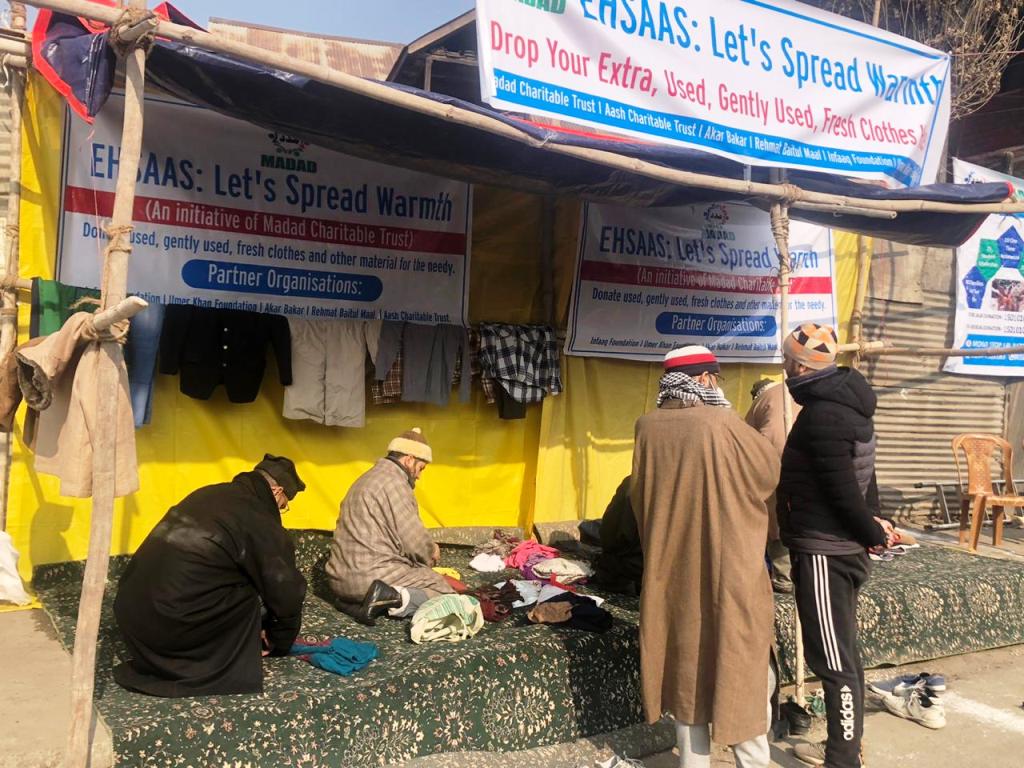
Initially scheduled for three days, the response prompted organizers to carry it for almost a week. The people associated with the initiative said that the step was taken based on reports from the locals, besides the input of shop keepers about the helplessness of buyers.
“There was a very good response, both from donors and beneficiaries,” Zahoor Ul Haq, administrator of the Trust, told Kashmir Life. The concept, he said, was “not to interfere and allow people to contribute as they please and the ones who require take as per their need.”
Another member, who was part of the initiative, said that there were around 2200 garments of varying sizes donated during the event. “It is all about humanity. As humans we can make our efforts, success lies with Allah. This initiative turned out to be successful and satisfying,” he said wishing anonymity.
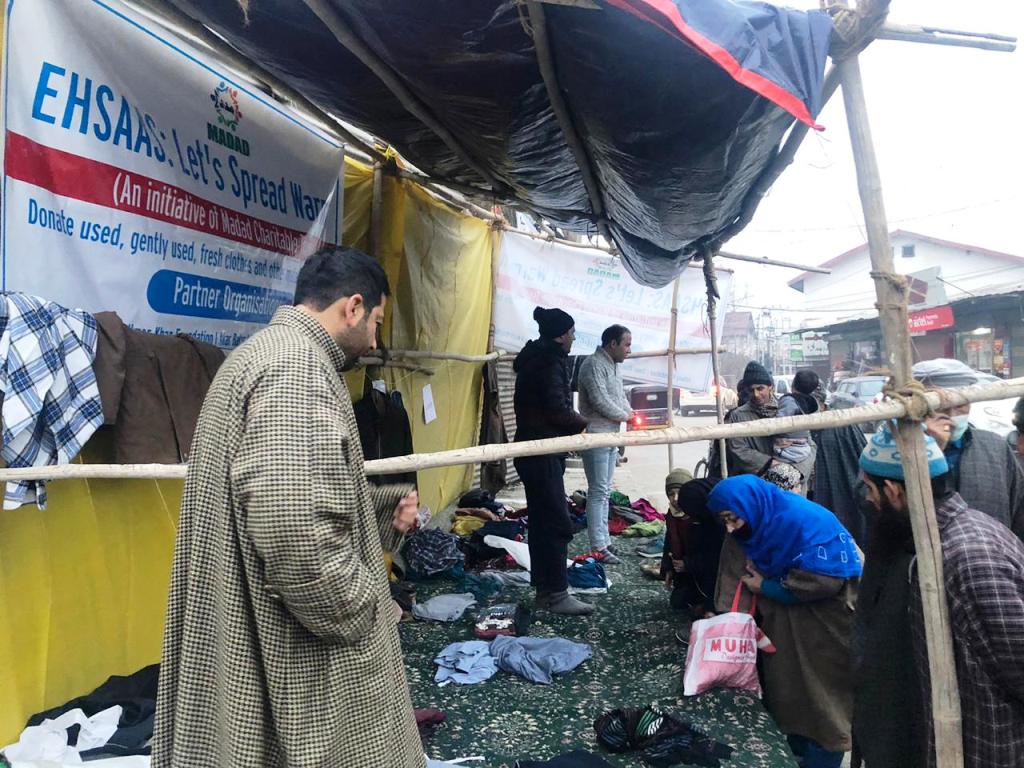
Spreading Warmth
Standing in a long line, members from marginalized families were waiting in the lawns of Bilaliya Education Institute in Lal Bazar.
The day was the beginning of winter’s harsh 40-day-period, locally known as Chillai Kalan. Understanding the difficult situation of the underprivileged class, a few like-minded individuals and institutions came together to start, Mission Wushnaer. An endeavour of Kashmir Welfare Trust (KWT) in association with Moral Education, Environment & Relief council of Private Schools’ Association JK, Food for Poor, and food for all groups, the aim was to protect people grappling with the cold and poverty. It was an inclusive assistance programme, consisting of Kangris, Charcoal, Woollen Pherans, Woolen Dress including caps, electric blankets, hot water bottles, jackets, pullovers, and food kits for one month.
Special assistance was also offered to specially-abled empowering them financially by providing them sewing machines. The initiative is cashless and as per the organizers, there are more than 300 families who were offered assistance. “The basic concept of this initiative was that nobody should extend his hand before others, and we are trying to help in whatever way possible,” said Manzoor Wangnoo, a businessman who also does social work.















